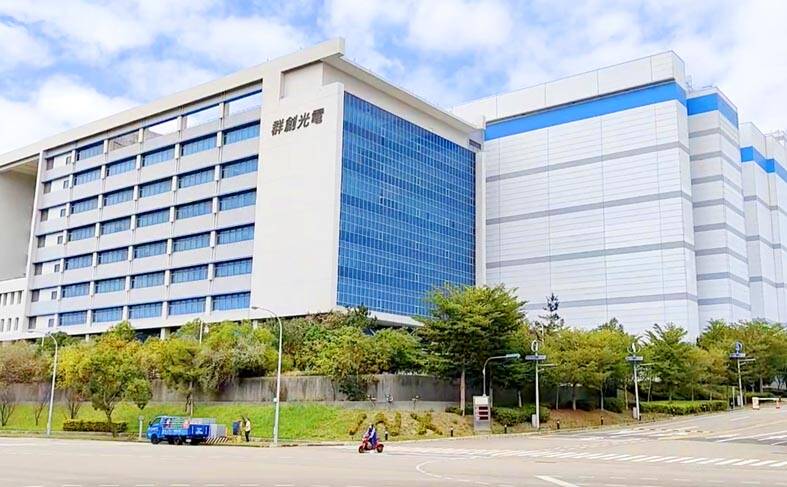Innolux Corp (群創) swung into a net profit of NT$6.47 billion (US$196.3 million) last year from a loss of NT$18.64 billion the previous year, which the flat panel display maker attributed to massive asset disposal gains.
The company booked a non-operating income of NT$16.15 billion last year, derived from gains of NT$14.7 billion from selling an idled plant in Tainan to Taiwan Semiconductor Manufacturing Co (台積電).
Earnings per share improved to NT$0.76, compared with losses per share of NT$2.01 in the prior year, Innolux said.

Photo courtesy of a reader via CNA
Using last year’s earnings and an allocation of the company’s reserved income, its board of directors approved a cash dividend distribution of NT$1 per share, it said.
Even so, Innolux has not steered out of the woods yet. The company reported a third consecutive year of an operating loss of NT$7.92 billion last year, following an operating loss of NT$18.71 billion the previous year.
Gross margin improved to 6.5 percent from 1.5 percent, and the margin of earnings before interest, taxes, depreciation and amortization (EBITDA) rose to 10.7 percent from 5.7 percent a year ago, the company said.
The company is positive about the flat panel market going forward, citing China’s subsidiary program for consumer electronics, which would stimulate replacement demand, and the US tariff hikes on imports, which are expected to prompt customers to front-load flat panels used in TVs and computers, Innolux said.
The introduction of new artificial intelligence (AI) models from DeepSeek (深度求索) is also accelerating the adoption of AI devices and applications, buoying up demand for computer flat panels, it added.
Shipments of large-sized panels used in TVs and computers are to drop by a low-single-digit percentage this quarter from last quarter, while shipments of small-and-medium-sized panels are to increase by a low-single-digit percentage sequentially, the company said.
To minimize the impact of the industry’s boom-and-bust cycles, Innolux has strived to expand into the advanced chip packaging, or panel-level packaging (PLP) technology, business.
However, disappointing demand for smartphones has delayed the company’s PLP product shipments from the end of last year it had scheduled, it said.
The company said non-display products contributed about 26 percent to the company’s total revenue during the final quarter of last year, up slightly from 24 percent in the same period of 2023. Display products made up 74 percent last quarter, down from 76 percent a year earlier.

With an approval rating of just two percent, Peruvian President Dina Boluarte might be the world’s most unpopular leader, according to pollsters. Protests greeted her rise to power 29 months ago, and have marked her entire term — joined by assorted scandals, investigations, controversies and a surge in gang violence. The 63-year-old is the target of a dozen probes, including for her alleged failure to declare gifts of luxury jewels and watches, a scandal inevitably dubbed “Rolexgate.” She is also under the microscope for a two-week undeclared absence for nose surgery — which she insists was medical, not cosmetic — and is

CAUTIOUS RECOVERY: While the manufacturing sector returned to growth amid the US-China trade truce, firms remain wary as uncertainty clouds the outlook, the CIER said The local manufacturing sector returned to expansion last month, as the official purchasing managers’ index (PMI) rose 2.1 points to 51.0, driven by a temporary easing in US-China trade tensions, the Chung-Hua Institution for Economic Research (CIER, 中華經濟研究院) said yesterday. The PMI gauges the health of the manufacturing industry, with readings above 50 indicating expansion and those below 50 signaling contraction. “Firms are not as pessimistic as they were in April, but they remain far from optimistic,” CIER president Lien Hsien-ming (連賢明) said at a news conference. The full impact of US tariff decisions is unlikely to become clear until later this month

GROWING CONCERN: Some senior Trump administration officials opposed the UAE expansion over fears that another TSMC project could jeopardize its US investment Taiwan Semiconductor Manufacturing Co (TSMC, 台積電) is evaluating building an advanced production facility in the United Arab Emirates (UAE) and has discussed the possibility with officials in US President Donald Trump’s administration, people familiar with the matter said, in a potentially major bet on the Middle East that would only come to fruition with Washington’s approval. The company has had multiple meetings in the past few months with US Special Envoy to the Middle East Steve Witkoff and officials from MGX, an influential investment vehicle overseen by the UAE president’s brother, the people said. The conversations are a continuation of talks that

CHIP DUTIES: TSMC said it voiced its concerns to Washington about tariffs, telling the US commerce department that it wants ‘fair treatment’ to protect its competitiveness Taiwan Semiconductor Manufacturing Co (TSMC, 台積電) yesterday reiterated robust business prospects for this year as strong artificial intelligence (AI) chip demand from Nvidia Corp and other customers would absorb the impacts of US tariffs. “The impact of tariffs would be indirect, as the custom tax is the importers’ responsibility, not the exporters,” TSMC chairman and chief executive officer C.C. Wei (魏哲家) said at the chipmaker’s annual shareholders’ meeting in Hsinchu City. TSMC’s business could be affected if people become reluctant to buy electronics due to inflated prices, Wei said. In addition, the chipmaker has voiced its concern to the US Department of Commerce